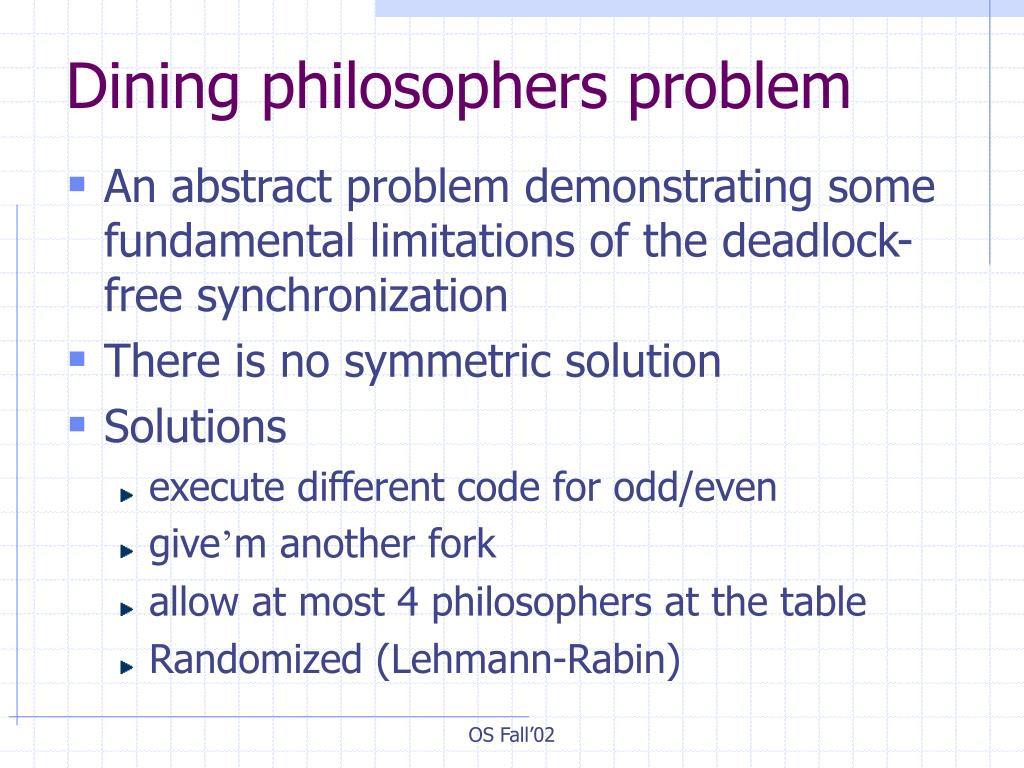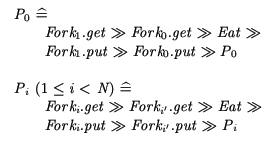
Can't think of a reason what could be the issue during concurrent execution. the thread executing the method would complete executing the method before other thread can start executing ) and results of the method would be visible to other threads(i.e updates in boolean array would be visible to other threads). Two threads can't execute the same method at a time.Hold and wait will not be applicable.Ĭorrect me if I am wrong, if a method is synchronized then: wantToEat waits untill both forks are picked and at the end it put down forks.ĭeadlock would be avoided as I am not holding one fork and waiting other to be available. I have created two synchronized method to pick and put down forks. The function may be called for the same philosopher more than once, even before the last call ends. The philosophers are assumed to be thinking as long as they are not asking to eat (the function is not being called with their number).įive threads, each representing a philosopher, will simultaneously use one object of your class to simulate the process.putLeftFork and putRightFork are functions you can call to put down the corresponding forks of that philosopher.eat is a function you can call to let the philosopher eat once he has picked both forks.pickLeftFork and pickRightFork are functions you can call to pick the corresponding forks of that philosopher.philosopher is the id of the philosopher who wants to eat.Implement the function void wantsToEat(philosopher, pickLeftFork, pickRightFork, eat, putLeftFork, putRightFork) where: The philosophers' ids are numbered from 0 to 4 in a clockwise order. Monitors alone are not sufficiency to solve this, we need monitors with condition variables Monitor-based Solution to Dining Philosophers We illustrate monitor concepts by presenting a deadlock-free solution to the dining-philosophers problem. A philosopher can take the fork on their right or the one on their left as they become available, but cannot start eating before getting both forks.Įating is not limited by the remaining amounts of spaghetti or stomach space an infinite supply and an infinite demand are assumed.ĭesign a discipline of behaviour (a concurrent algorithm) such that no philosopher will starve i.e., each can forever continue to alternate between eating and thinking, assuming that no philosopher can know when others may want to eat or think. Semaphores can result in deadlock due to programming errors. After an individual philosopher finishes eating, they need to put down both forks so that the forks become available to others. Each fork can be held by only one philosopher and so a philosopher can use the fork only if it is not being used by another philosopher. However, a philosopher can only eat spaghetti when they have both left and right forks. Forks are placed between each pair of adjacent philosophers.Įach philosopher must alternately think and eat. Makefile: A single Makefile to build each program.Five silent philosophers sit at a round table with bowls of spaghetti.Part2: C program implementing a deadlock-free solution when philosophers require both forks and access to sauce bowls.Part1: C program implementing the waiter's solution to the Dining Philosophers Problem using synchronization primitives.This approach extends the solution to accommodate the use of sauce bowls.If a bowl is available, they eat with the forks and bowl, return them, and enter a thinking state.
#DINING PHILOSOPHERS PROBLEM JAVA DEADLOCK FREE#
The philosopher is free to choose any unoccupied bowl.However, once a philosopher acquires both forks, they also check for the availability of a bowl.The philosopher allocation and fork-handling process remains the same as in Part 1.This part extends the first solution with the addition of sauce bowls.


The challenge is to design a solution that prevents deadlock, where no philosopher can eat because they can only access a single fork. A philosopher can only eat if they can acquire both forks. Each philosopher has a plate and a fork to their left and right. The Dining Philosophers Problem involves a round table with five philosophers sitting around it.

The goal is to design a protocol that allows the philosophers to eat without encountering deadlock. This repository contains the solution to the Dining Philosophers Problem, a classic problem in deadlock management.


 0 kommentar(er)
0 kommentar(er)
